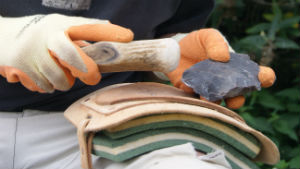“A Day in the Ice Age” – find out how our earliest ancestors survived
28 June 2017

Members of the public are being invited to find out what life was like for our ‘Ice Age' ancestors, on Wednesday 12th July at Reading Museum.
Through a series of demonstrations and activities, "A Day in the Ice Age" aims to improve understanding of how our earliest ancestors survived life in ‘Ice Age' Europe.
Led by the University of Reading, the University of Brighton and Reading Museum, "A Day in the Ice Age" is free to attend between 3pm and 6pm, and activities and demonstrations will take place both outdoors in Forbury Gardens, and indoors in the Town Hall, Blagrave Street.
Sessions will include:
- Tool-making (Forbury Gardens): Stone tool making with James Dilley of Ancient Craft
- Hide-working & clothing construction (Forbury Gardens): Turning animal hides into clothing with Dr Theresa Kamper, who has been tanning skins using traditional techniques for over twenty years
- Shelter building and fire-making (Forbury Gardens): Cold climate bushcraft with wilderness survival instructor Joe O'Leary
- ‘Ice Age' animals (Town Hall): Go on safari and meet the mammoths and other animals
- ‘Ice Age' humans (Town Hall): What did our ancestors look like?
- ‘Ice Age' toolkits (Town Hall): What tools did our ancestors leave behind?
All of these sessions will run on a loop between 3pm and 6pm, with each session lasting approximately 30 minutes.
The event is linked to a wider project funded by the Arts and Humanities Research Council and run by Dr Rob Hosfield from the University of Reading (Archaeology Department) and Dr James Cole from the University of Brighton (School of Environment & Technology). The wider networking project has recently brought together academics from across Europe to discuss the earliest humans in Europe, the climatic challenges they faced, and how they may have coped with them.
Dr Rob Hosfield, University of Reading, said: "This event is an opportunity to learn about our ancient ancestors and the skills and techniques they used to survive in the challenging conditions of ‘ice age' Europe. Come along and find out more, and fingers-crossed for good weather!"
